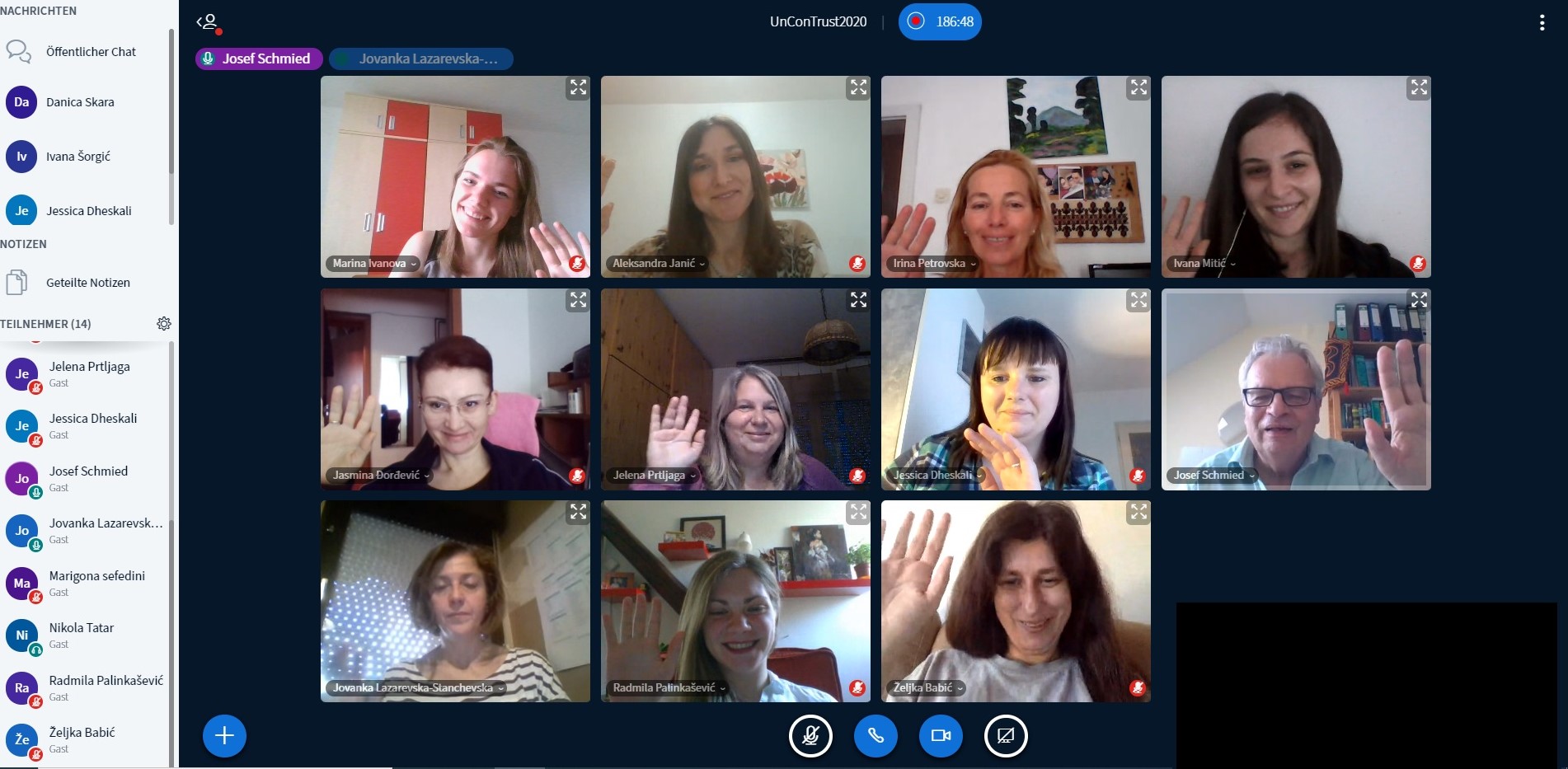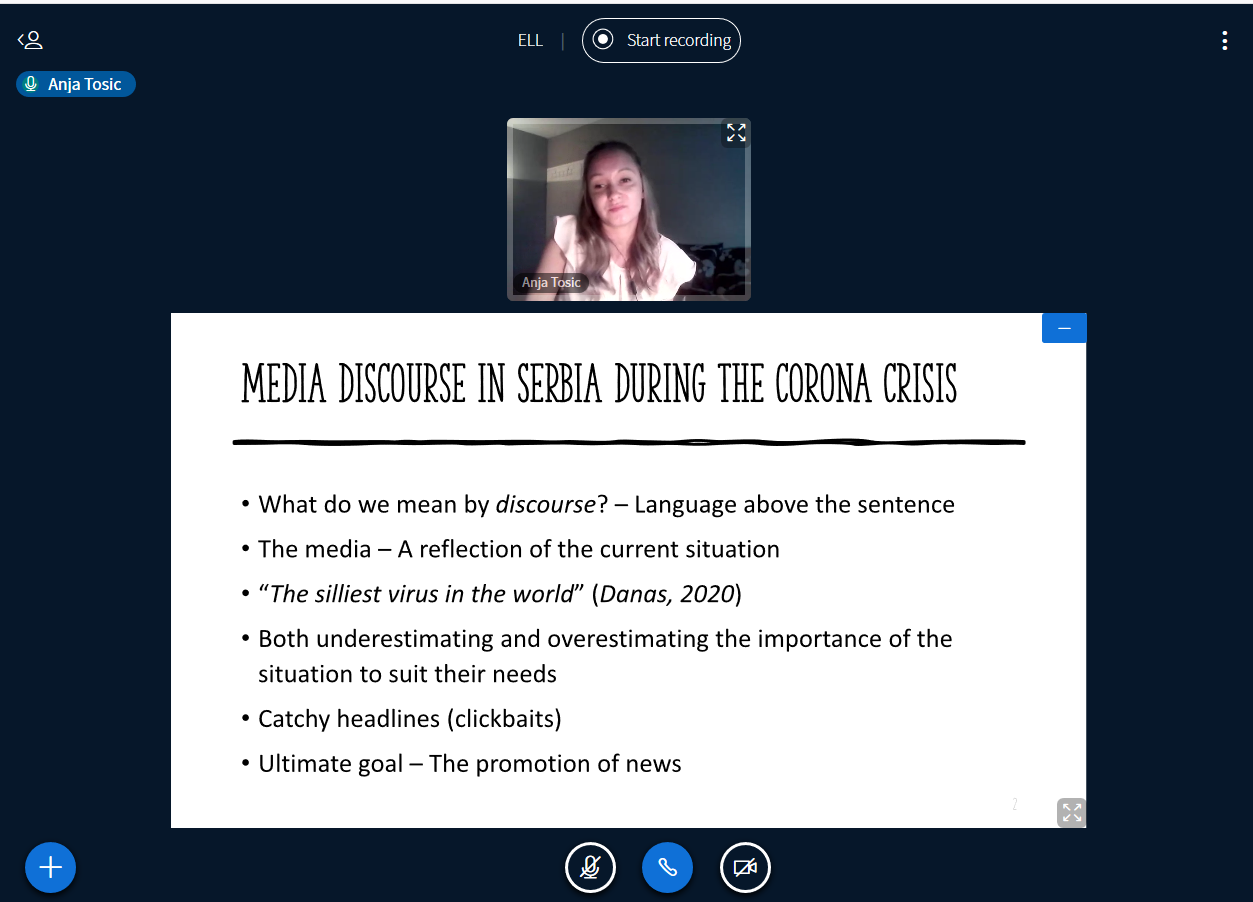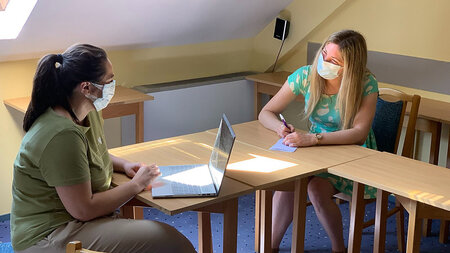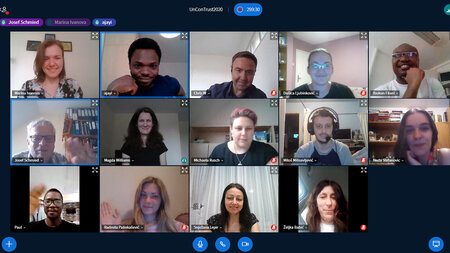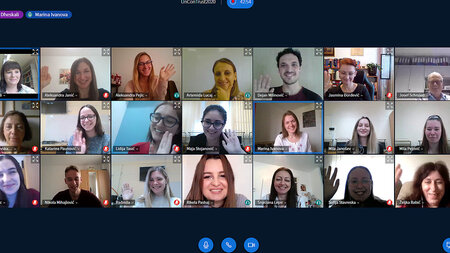From Uncertainty to Confidence and Trust (UnConTrust)
The theme of this year is From Uncertainty to Confidence and Trust (UnConTrust=short forms for UNcertainty+CONfidence+ TRUST, but also no contrast, emphasizing the common ground and not differences between national groups in SE Europe). The project has a long-term tradition of teaching academic and journalistic writing, based on successful summer schools from 2013 to 2019. It will unite in Serbia previous partners from universities in Germany, Albania, North Macedonia, Serbia and Croatia as well as new partners from Bosnia and Kosovo. The project's theme is connected with the previous theme, Conflicting Truths. Uncertainty is seen here as a natural starting point for scientific and journalistic writing, which, through detailed work and conscientious presentation, first leads to trust in oneself and one's own work, and finally fosters trust in the listener or reader. The theme perfectly reflects several uncertain aspects in the Balkans, which the project partners (teachers) will critically evaluate, to shape a (small) new unified academic community from the Balkans.
In "corona times", growing uncertainty may lead to less trust, but if you see uncertainty positively as a normal challenge and risk awareness, this can give confidence in your own strengths (and awareness of limitations!) and this makes cooperation and trust possible and even vital. Awareness of uncertainty is good in science, only politicians think they cannot live with it.
All our project concepts crisis (2017), honesty (2018), truths (2019), uncertainty (2020) and trust online (2021) are more important than ever - write about them critically, this is our contribution to the public understanding of science!
We are happy to announce that the project will be continued in 2021 - the new focus is on constructing confidence and trust online.
Study and exchange
The TU Chemnitz English Department welcomes students and scholars for semesters abroad and our international Master's study program in English. Find more information on exchange opportunities on the website of our International Office. TU Chemnitz students are also encouraged to explore our Erasmus partnerships with South Eastern Europe.
Digital Workshop 2020: June 22 (2-4pm) and June 24 (10-12 noon)
Online conference test session on June 15
The workshop will be organised online on Big Blue Button, an open-source web conferencing system.
Presentations and workshop recordings
All partners, including new ones from Kosovo and Bosnia, will discuss organisational aspects of the upcoming summer school in Serbia (e.g. group activities) and theoretical concepts.
Monday, June 22
[2-3 pm] Josef Schmied, “From uncertainty to confidence & trust: Concepts & examples” Feedback
[3-3:20 pm] Marina Ivanova, "Building trust between editors and contributors: Formal and methodological considerations for REAL 18" Feedback
[3:20-3:30 pm] Jessica Dheskali, "How to teach and train confidence and trust in academic writing classes" Feedback
[3:30-4 pm] Project partner discussion + brainstorming
Wednesday, June 24
[2-2:25 pm] Jasmina Đorđević & Ivana Šorgić, "Sociocognitive discourse markers of suffering during the Corona crisis: Can we trust the news?" Feedback
[2:25-2:50 pm] Ivana Mitić, "Syntactic forms used to build trust: The state of emergency because of the coronavirus in Serbia" Feedback
[2:50-3:15 pm] Bledar Toska & Armela Panajoti, “Transitivity analysis from (un)certainty to (dis)trust in COVID-19 Albanian newspaper reports” Feedback
[3:15-3:40 pm] Jelena Prtljaga, “Using deontic modality to create (in)confidence and (dis)trust ” Feedback
[3:40-3:55 pm] Irina Petrovska, “ ”Language tools of expressing uncertainty, confidence and trust in coronavirus Macedonian newspaper reports” Feedback
[3:55-4:20 pm] Gordan Matas and Danica Škara, “The global pandemic and the war of words: Metaphor, humour and trust” Feedback
[4:20-4:35 pm] Radmila Palinkašević, “In times of uncertainty who can we trust? – Discourse analysis of government announcements in Serbia in the time of the Coronavirus pandemic” Feedback
[4:35-4:55 pm] Jovanka Lazarevska-Stanchevska, "From denial to acceptance and confidence: Linguistic analysis of reports of coronavirus in the news" Feedback
[4:55-5 pm] Workshop closing
Please submit your feedback till the end of the week and contact students that would like to present on the conference Digital English World-Wide (send presentations by July 5).
Insights from last year's workshop:
Conference participation
Three master's and PhD students from Niš and Vršac in Serbia and Kosovo/Chemnitz presented their research projects in the online conference Digital English World-Wide: Corpus and Discourse Analyses. The students managed to spark intriguing discussions on uncertainty, confidence and trust in media and scientific discourse and to gather useful feedback and reading recommendations.
Last year, the students enjoyed a study visit in Chemnitz where they attended trainings in academic writing and presentation and gave talks in the conference Digital English World-Wide: Corpus and Discourse Analyses.
Digital Summer School: October 15, 27 and 29
The summer school will be organised online on Big Blue Button, an open-source web conferencing system. Students will participate in workshops on discourse analysis, cooperate in international groups and present their national experiences of uncertainty, confidence and trust.
Link to the online conference room on BBB
Link to the BBB recordings from 27.10
Link to the BBB recordings from 29.10
Link to the Cloud with presentations and materials
As a participant in the former and this year "late" summer school I must say that I am honoured to have seized such an amazing opportunity.
Last Summer School topic was "Conflicting Truths" and it took place in Ohrid, Macedonia, a city with a hive of activity. It was actually my first experience in such a school, I call it a school because I learnt a lot from the best people and of course my colleagues.
Not only did we take a closer look into such a significant matter as it is the language and more specific how the language in academic and journalistic writing is being used for drawing certain conclusions, but we were to think outside of the box, breaking nationalities stereotypes and working as a united team with the other members from different countries.
I must say that I had the luck to create real relationships and friendships and meet amazing people starting from the organizers till to the golden opportunity that I had to interview a very remarkable figure as Mr. Kliment Naumov who highlighted and emphasized very critical issues for the status of Ohrid as an World Heritage Site.
Something that this year during to this pandemic was difficult to be attained.
No matter that, the good work continued in a different approach, but on the same line as last year with as significant matters correlated with each other and being crucial for journalistic and academic writing in the framework of the UnConTrust 2020, Uncertainty, Confidence and Trust in a dificult time when: "We are not just fighting an epidemic but we are fighting an infodemic" as Tedros Adhanom General Director of the World Health Organization would state.
Meaning that at a time when reliable information is vital the whole world it is in the middle of a tsunami full of misinformation where fake news about Covid-19 might be spreading faster than the truth.
I would like to paraphrase Malcom X here who once said that "The media is the most powerful tool on the planet, it could make the liar to be the truthful and the truthful one a liar". With such a wise declaration I would like to say that during this Digital Summer School we managed to reach the set forward aims by getting different perspectives and very valuable contributions for the actual situation in the journalistic writing, setting the fine line between truthful news or accurate information and misinformation in order to understand the means through which such complexity is achieved.
To conclude my impression are second to none about all the aspects.
Thank you and hopefully we will see each other next year.
Rikela Pashaj.
Thursday, October 15, 10-12 am
[10-10:30] Welcome and introductory talk by Josef Schmied
[10:30-11] Workshop on analysing newspaper discourse by Jasmina Đorđević
[11-12] National experiences by each school (5-10 minutes) - each national group can meet in person and be in one room (if possible)
Tuesday, October 27, 10-12 am
[10-10:30] Welcome back + National experiences
[10:30-11:00] Workshop on smart online research and discourse annotation by Marina Ivanova
[11:00-11:15] Transitivity analysis from uncertainty to certainty in COVID-19 newspaper reports by Bledar Toska and Armela Panajoti
[11:15-12] International interactive breakout rooms and reports (use your own computer)
Thursday, October 29, 10-12 am
[10-11:30] Five group student presentations on results from media research - (inter)national perspectives on UnConTrust
[11:30-12] Lessons learned
Student contributions
Please send your discourse analysis homework to Jasmina Đorđević at djordjevic.jasmina@…
Please send your REAL contributions (essays, papers, photo collages, photo creations) to Marina Ivanova at marina.ivanova@…
Insights from last year's summer school:
REAL abstract submissions (Deadline: September 1)
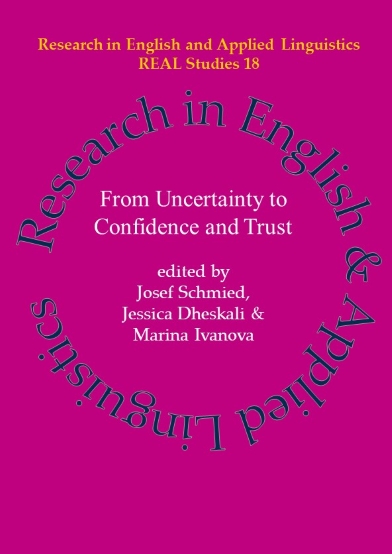
On uncertainty, confidence, and trust in journalistic and academic writing: Concepts and examples
This general survey re-analyses the key concepts of our times and of our successive cooperation projects: crisis (2017), honesty (2018), truths (2019), uncertainty, confidence, trust (2020) and chaos, order (?2021) and follows their development of the international discourse over the last few years. It defines uncertainty, confidence, and trust from linguistic and from philosophical perspectives so that the project shares a common conceptual frame and reference.
The basic argumentation is: In "corona times", growing uncertainty may lead to less trust, but if you see uncertainty positively as a normal challenge and risk awareness, this can give confidence in your own strengths (and awareness of limitations!) and this makes cooperation and trust possible and even vital. Awareness of uncertainty is good in science, only politicians think they cannot live with it.
Keywords: key concepts, uncertainty, confidence, trust, scientific writing, journalistic writing
Sociocognitive discourse markers of suffering during the Corona crisis: Can we trust the news?
Based on Van Dijk’s theory of Sociocognitive Discourse Studies and Chouliaraki’s theory on the Mediation of Suffering, this research is aimed at identifying sociocognitive discourse markers which have been employed with the specific intention to attract readers’ attention and sell the story no matter what. Even when the news are to orientate a Western spectator towards the suffering of ‘Others’ who belong to the same category of the economically and politically strong world, the news resort to sociocognitive discourse markers with the aim to attract readership rather than boost confidence and trust. The obvious outcome is that the suffering thus presented in the news causes even more uncertainty among the readers. The corpus compiled for this research consists of news representations of the Corona crisis in 2019/2020 in the Canadian daily paper The Globe and Mail. By identifying sociocognitive discourse markers that clearly reflect a mediated representation of distant suffering, this research will demonstrate that news agencies will try to overcome the “out-of-sight-out-of-mind” phenomenon even in cases when economic and political power relations are equal. In other words, news agencies will resort to whatever resource possible, even violate the core principles of journalism just to sell their story.
Keywords: Suffering, sociocognitive discourse markers, uncertainty, trust, Corona crisis.
Uncertainty in science vs. certainty in politics: Contrasting axioms in Corona texts
This discussion highlights the completely different “professional expectations” that lead to interesting misunderstandings and controversies in the national discourse on “Corona” in Germany in early 2020. Whereas “real, good scientists” are expected to indicate uncertainty, i.e. to mark the limits of their professional knowledge, “real, good politicians” are expected to avoid uncertainty, i.e. to come across as a determined leader who knows what to do. This leads to the perception that scientists come across as “changing the goal posts” (“you can never agree on figures” or “just give us the right parameters to follow”) and politicians come across as “undercomplex” (“simple minds who always want simple answers”). In talk shows on German TV, for instance, the change of indicators (days of doubling infection rates – ratio of infections to population – case numbers) was taken as confusing by politicians and as necessary adaptation to pandemic developments by scientists. But some scientific pre-publications were also criticized. This contribution looks critically at argumentative patterns and linguistic markers. It thus tries to make a contribution to the general understanding of science in corona times and beyond.
This analysis discusses uncertainty markers in four different genres on the same topic, “Heinsberg-Study” on mortality rates in April 2020: the research article as first publication draft, an accompanying “press briefing”, a following newspaper report and hundreds of public comments underneath.
It also analyses critically the German public debate on the “Drosten study” on the virus load in school children, which was important in the “opening debate” in Germany in May 2020.
The national discourses in Germany show that although scientists are still accredited with high credibility, the procedures of scientific enquiry are difficult to understand at least for some politicians and contributors to traditional and digital media.
Keywords: scientific writing, journalistic writing, public discourse, (un)certainty, trust
Trust in police and national institutions in the US? A critical discourse analysis of ‘I can’t breathe’
This paper addresses the changing discourse of ‘I can’t breathe’, a phrase which has become shorthand for claims of police brutality and a lack of trust in the very institutions meant to provide safety and protection to all Americans. In this pilot study, I use critical discourse analysis to examine the official responses of President Trump, former Vice President Biden and former President Obama to George Floyd’s death in May 2020 and the widespread protests which followed. Drawing on Reisigl & Wodak’s (2009) discourse-historical approach, I examine discursive strategies and the ways in which these politicians use language to address the concerns of the American people. Reflecting the existing tension between colorblindness and post-racial ideologies in the United States on the one hand and a clear acknowledgement of systemic racism in the US on the other, the analysis shows how the context of the global pandemic affected the relevance and urgency of the statement ‘I can’t breathe’. Furthermore, it illustrates that potential politicians have to set the agenda for policies leading either to a challenge or a continuation of the status quo, in turn influencing trust in police and national institutions for years to come.
Keywords: Black Lives Matter, protest, George Floyd, critical discourse analysis, ‘I can’t breathe’
Conspiracy theories on Twitter in the wake of the US presidential election 2020
The present paper deals with the phenomenon of conspiracy theories that has gained quite some interest among researchers in the past couple of years (Douglas et al. 2019, Gray 2008, Keeley 1999, Uscinski 2018). The interesting question is, why do people engage in conspiracist thinking and spread these, sometimes very obviously wrong, claims? For this paper, I selected one of the most polarizing figures in politics – Donald Trump. His tweets have become a subject of controversial debate among researchers (Blommaert 2018, Varis 2020). The theoretical part of this paper (section 2) introduces definitions of conspiracy theories and people’s motivations to spread them. The practical part (section 3) investigates selected tweets from Trump’s account on three different conspiracy theories: (1) Trump as the truth teller, (2) downplaying of the danger of Covid-19 and (3) the latest voter fraud accusations during the 2020 US presidential elections. The analysis showed that Trump makes use of these conspiracy theories to serve his presidency and the values of his supporters. In addition, it illustrates that his conspiracist claims lack evidence and further divide the US into an in-group (conspiracy supporters) and out-group (conspiracy opponents), which is one characteristic of conspiracies (Krekó 2015). In how far these theories alter the discourse of a society needs to be analyzed and discussed in further research projects.
Keywords: conspiracy theory; US presidential election; Donald Trump; Covid-19; voter fraud allegations; Twitter
Lazarevska-Stanchevska, Jovanka and Škara, Danica. Vocabulary and metaphors in times of uncertainty.
The linguistic impact of the global pandemic: Vocabulary and metaphors in times of uncertainty
In March 2020, the World Health Organization (WHO) declared the outbreak of a new disease formally named “COVID-19”, an abbreviation for “coronavirus disease 2019”. This global pandemic has become one of the most frequent topics in the political debate and the public media, thus providing a fertile ground for the linguistic analysis of media reports. This study explores the vocabulary used in the news of international mainstream media between February and October 2020. A cognitive metaphor linguistic approach (following Lakoff & Johnson 1980) is used to trace some of the linguistic changes during the global pandemic, considering metaphors, fixed expressions, compounds, and collocations. This contribution is based on a corpus of news pieces published between February and October 2020 in English and Croatian, including sources from non-English-speaking countries published in English. In particular, it works with a sample of nearly 10,000 words to discuss the phases of the unwinding of the pandemic and dominant metaphors. The analysis showed that similar collocations (e.g., the new normal, social distancing) and conceptual metaphors (e.g., the disease as war, sport, natural disaster) dominate the discourse of globally situated newspapers in English and Croatian.
Keywords: lexical analysis, rhetorical tropes, naming and reference, perspective, emotions
In times of uncertainty who can we trust? – Discourse analysis of government announcements in Serbia in the time of the Coronavirus pandemic
The coronavirus (COVID-19) pandemic has brought with it uncertainty on numerous fronts to individuals all around the globe. In these times of distress citizens turn to their governments for support and leadership in the hopes of successfully overcoming the crisis. Have the citizens of Serbia been able to find that support in the information that was given to them in this period or were the levels of uncertainty escalated? This is a socio-linguistic study which implements the method of discourse analysis. The aim of the study is to explore how information, in Serbia, was conveyed to the wider public during the uncertain times of the Coronavirus pandemic, specifically from its introduction to the public until the end of the national state of emergency in Serbia. The study analyzes a number of key government announcements which were made before and during the state of national emergency had been declared in Serbia due to the Coronavirus pandemic. The national state of emergency in Serbia lasted from March 15 to May 6, 2020. The selected public announcements were transcribed and analyzed. Statements which convey the speakers’ stance towards the seriousness of the virus, the situation and the measures that needed to be taken, were extracted and sorted for conflicting information and stances. After which the statements were analyzed in regard to the levels of certainty conveyed.
Keywords: trust, uncertainty, discourse analysis, socio-linguistics, coronavirus
How feigning certainty is used by the Serbian media for the promotion of news
This research aims at exposing the discrepancy between journalists’ fake promises of predicted outcomes and the actual, not so predictable and not so optimistic, reality. Focusing on epistemic modality and on different kinds of lexical choices journalists resort to when writing article headlines, this research attempts to show how journalists deliberately try to appear certain in those pieces of news they want to sell in order to attract attention and secure readership. Relying on Critical Discourse Analysis, the conclusions in this research are drawn based on the analyses of news reports dealing with the Corona crisis in Serbia. The corpus comprises ten pieces of news compiled from online newspapers published in Serbia during the coronavirus pandemic. The results of this research suggest that, especially at times like this – when audiences seek some kind of positive reassurance and even the slightest of faith in an optimistic outcome – people often find themselves being tricked into reading optimistic-sounding news, ultimately getting disappointed by the actual reality and losing trust in the media in the process. Although this method of feigning certainty quite often results in the loss of trust, it still proves useful to those journalists wanting to promote their news no matter what.
Keywords: Critical Discourse Analysis, certainty, trust, epistemic modality, Corona crisis
Media, terrorism, and trust: Ten years of foreign fighters in news discourse (2011–2021)
This research is aimed at investigating the way in which Foreign Fighters (FF) are represented by the media in English-speaking countries. FF are defined as people who voluntarily participate in a conflict that does not involve their home country. Since it is believed that they might present a real terrorist threat once they go back to their home countries, FF are a very important issue the international community is facing today. The decision to focus on media discourse lies in the fact that, as media communicates information to billions of people, their representation of FF is crucial for shaping the public perception and opinion of the matter. Applying both a corpus-driven quantitative analysis and a qualitative analysis, carried out using Critical Discourse Analysis (CDA), this study investigates the representation of FF by English-speaking newspapers during a ten-year period, from 2011 to 2021. This pilot study, in particular, will focus on the preliminary findings of this research, obtained by analysing the keywords and collocations related to FF in a smaller sample of the corpus. The major identified discourses are those of terrorism, religion, and security.
Keywords: foreign fighters, media, discourse, Critical Discourse Analysis, corpus linguistics
Uncertainty in postgraduate training and supervision: A needs analysis for online course development.
Uncertainty and self-doubt accompany postgraduates on their personal and career development, as the dissertation project is the first independent and innovative research endeavour they undertake. This case study presents a recent needs analysis at the TU Chemnitz English Department for the development of an online workshop series on empirical linguistic research. An online questionnaire allowed students to give feedback on their perceived difficulty of 64 research aspects from the categories: research design, data collection & analysis, writing & publication, and psychology & peer review. The many discrepant results demonstrated the different specialisations and skills of the students and accordingly the challenges of structuring unified postgraduate training. The contribution elaborates on the implications of the fully online format of the workshop series and provides suggestions for productive online teaching and discussions. Customised postgraduate training is seen as a key opportunity for students to acquire demanded research skills, overcome their uncertainties, and accordingly gain self-confidence and evoke trust in the research community.
Keywords: needs analysis, uncertainty, PhD workshop, research skills, confidence
Thriving in isolation: Facilitating doctoral candidates’ confidence and writing success
The rites of passage when progressing from postgraduate to an accepted member of the academic community present numerous challenges for young researchers. Principally, the ability to publish good quality research in a suitable academic way which befits the high standard of the research is fundamental. However, the accepted ‘bar’ is sometimes seemingly unreachable for some students, and this can lead to uncertainty, self-doubt, and a subsequent withdrawal from the learning process. Similarly, some supervisors may find themselves faced with questions relating to the academic writing conventions of their discourse. Currently, universities are addressing this issue through separate academic writing provision. Considering that ‘research is writing’, students’ style will evolve alongside their research, and in this way, their needs will be timely. At a time when students are increasingly isolated in their practice, this paper argues that instructors should abandon the model of the teacher as a fountain of knowledge, and instead become a writing facilitator who enhances active learning techniques (Wingate 2007). We present ways in which academic writing can be taught at a higher level as a situated, and sustainable, social practice to improve writing confidence and success.
Keywords: academic writing, higher education, embedded teaching, uncertainty, confidence, PhD, hedges, scale-up, tutorials
UnConTrust in the media
Follow our activity under University News (below)
Publication Guidelines for REAL 18
(Deadline: September 1, 2020)
Model contribution
Preprint submission by Jasmina Đorđević and Ivana Šorgić. Sociocognitive Discourse Structures Presenting Suffering during the Corona Crisis: Can We Trust the News?
Length
12-17 pages (min. 10, max. 25), 5000-9000 words (main text, counted without the abstract and references)
Basic structure
IMRAD (Introduction, Methods, Results, and Discussion) or AIMAC (Abstract, Issue, Methodology, Analysis, Conclusion)
Feel free to change the section headings to suit your topic.
Formatting
Authors should use the volume template which they will receive via email once they submit their abstracts. All paper components, including title, abstract, headings, text and captions should be formatted by applying the styles from the template.
Citation
REAL 18 uses APA 7 and all sources must be cited accordingly. One exception are in-text citations, where years and page numbers are to be given as "(yyyy: p)", e.g. "(2012: 33)". Try to provide as detailed citations as possible (including page number or at least chapter).
Primary sources
Primary sources present direct and immediate evidence. Those are e.g. corpora and examples from them, legal documents, literary works, etc. Make sure to always give telling names to your corpus files and cite them with each example.
Secondary sources
Book
Author, A. A. (Year of publication). Title of work: Capital letter also for subtitle. Publisher Name.
Edited book
Editor, E. E. (Ed.). (Year of publication). Title of work: Capital letter also for subtitle. Publisher.
Article or chapter in edited book
Author, A. A., & Author, B. B. (Year of publication). Title of chapter. In E. E. Editor & F. F. Editor (Eds.), Title of work: Capital letter also for subtitle (pp. pages of chapter). Publisher.
Journal article
Author, A. A., Author, B. B., & Author, C. C. (Year). Title of article. Title of Periodical, volume number(issue number), pages. https://doi.org/xx.xxx/yyyy
Online news article
Lastname, F. M. (Year, Month Date). Title of article. Title of Publication. URL
For non-English sources, include an English translation in square brackets "[]" after the foreign-language text. Transliterate Cyrillic titles to the standard Latin ortography.
Consult the APA 7 manual and blog and the Purdue Online Writing Lab for other source types.
Resources on Uncertainty, Confidence and Trust
Reading recommendations
Fandrey, A. (2017). Academic slide design. Visual communication for teaching and learning. Scale & Fine.
Research topic in Frontiers in Psychology: Coronavirus Disease (COVID-19): The Impact and Role of Mass Media During the Pandemic.
Inspiration
The Eurobarometer 92 survey investigates media use and trust in the EU member states and 5 candidate countries (Albania, Montenegro, N. Macedonia, Serbia, Turkey). Find it online and in a report by the European Broadcasting Union.
Check out the Conference on Truth and Trust Online with its proceedings and online talks. In addition to the more technical contributions, there are talks on "Rational Choices about Trust", "Human Values in the Spread of Misinformation" and "Disinformation as Collaborative Work".
Opportunities
The Andrássy Gyula German Language University Budapest offers scholarships for Master's studies for students from Albania, Bosnia, Kosovo, N. Macedonia, Montenegro, and Serbia among others.

